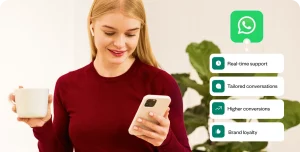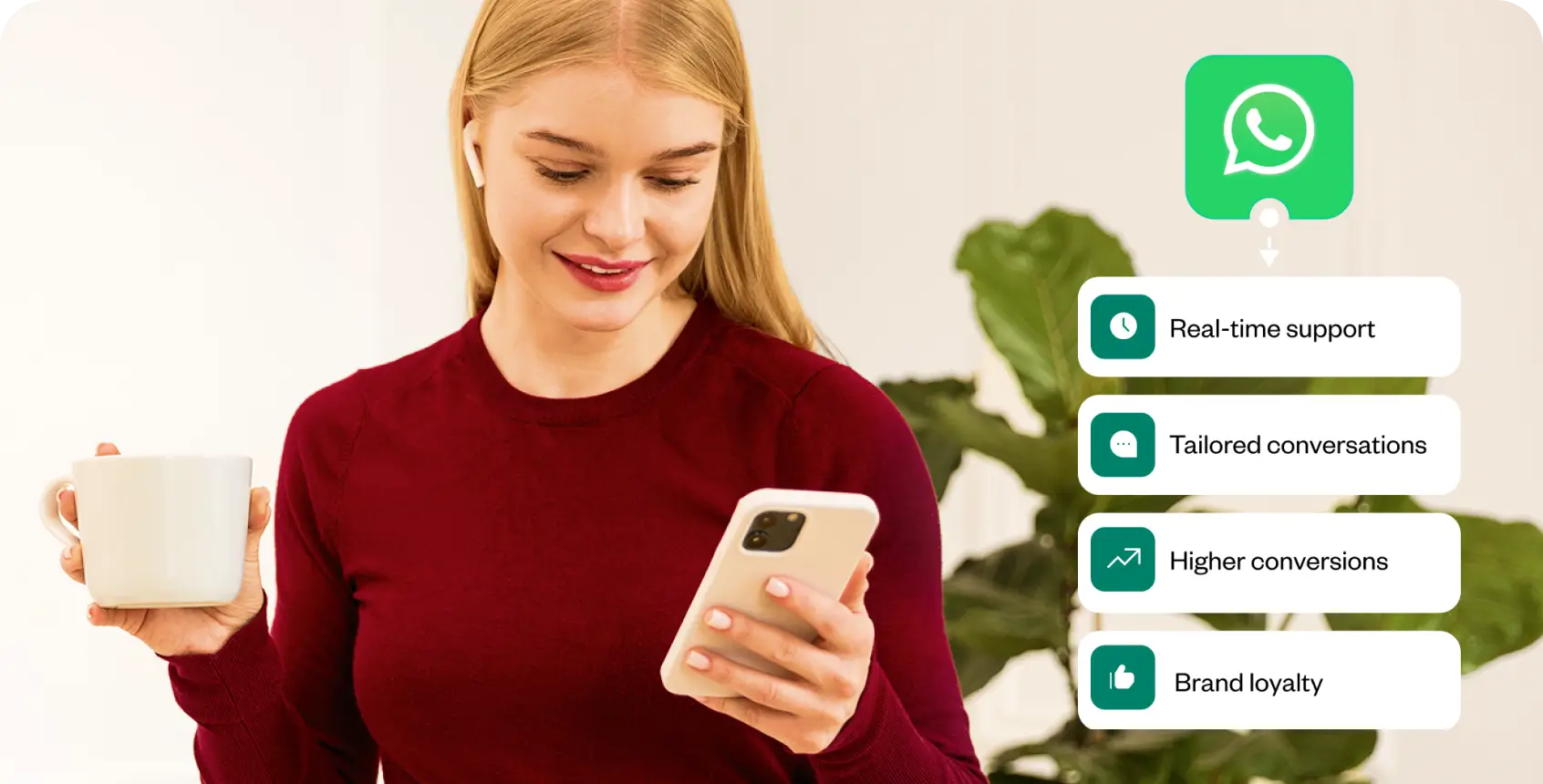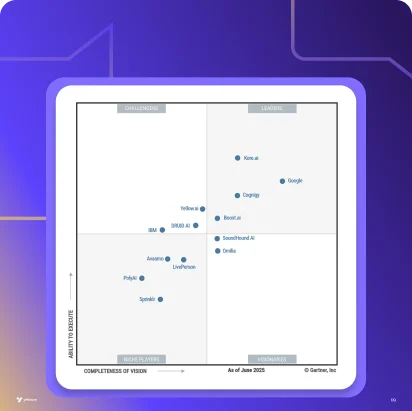What is a WhatsApp business opt-in and why do I need it?
As WhatsApp business clearly defines it: “A user must first consent to receive messages in WhatsApp by opting into them “
This means that a business cannot send the first message to the user unless the user has “opted-in” to receive WhatsApp notifications/messages.
If a business wants to send WhatsApp push notifications such as Order Status, Reminders, updates, etc, the business first needs to get user opt-in.
Related must read:
- WhatsApp chatbot – How to create AI WhatsApp bot?
- WhatsApp ads: A comprehensive guide for maximize click-to-chat
- WhatsApp session messages, their limitations and overcoming them
- Auto-reply on WhatsApp – Best practices and benefits
- 11 WhatsApp notification message templates for every business
How do I get WhatsApp opt-in from the customer?
WhatsApp Opt-in can happen on any 3rd party channel as well as on Whatsapp thread.
9 Ways to get WhatsApp Opt-in:
1. SMS Blast(with consent URL)
2. Email Blast (with consent URL)
3. Miss Call(Auto trigger a welcome message on WhatsApp)
4. Outbound/Inbound IVR
5. Physical form(with backend data entry process to manually call the Opt-In API)
6. QR Codes
7. POS system entry at the time of checkout
8. External Web page/webview trigger from within WhatsApp messaging interface
9. WhatsApp Chat
The opt-in web page should contain a checkbox like this:
The checkbox can be separate. The customer has to be clearly notified that they are opting in for what kind of messages eg transaction updates.
1. Can I send messages to my customers without Whatsapp opt-in? Is there some workaround?
No, you cannot send a message to the customer unless they have opted-in. WhatsApp is GDPR compliant.
2. What happens if I send messages without WhatsApp business Opt-in?
WhatsApp business reserves the right to revoke the brand’s WhatsApp license and registration and the message may fail with a “User not opted in” response. And it might be difficult for the brand to apply for re-registration.
3. How does WhatsApp check whether I have taken opt-in before sending notifications?
To ensure compliance, WhatsApp will routinely check a business’ opt-in flows. They will also monitor the quality signals you’ll see in your WhatsApp Account. When they are red, WhatsApp will verify opt-in flows.
4. What if the customer messages my brand’s WhatsApp Number?
This is considered as “issue resolution” and the brand has to reply to the customer within 24hrs. The brand can send a push notification related to the original support thread and the template type has to be “issue-resolution”.
5. Is it considered WhatsApp opt-in if the customer messages my brand first?
No, this is not considered WhatsApp opt-in. The brand is not allowed to send any push notification except the “issue-resolution” type. But it opens a 24-hour session window, where the brand can send a message to the customer asking for opt-in.
6. What is the WhatsApp issue resolution type template?
WhatsApp Issue Resolution templates allow you to respond to questions, concerns, or feedback from customers about your business.
7. Can I get WhatsApp opt-in from my customer on offline paper forms?
Yes, however, the same guidelines have to be followed. There has to be a separate checkbox for WhatsApp that is clearly visible with the WhatsApp logo, which then has to be updated in WhatsApp flow.
8. Can I do an IVR Blast or call my customer to get a WhatsApp opt-in?
As per the recent update, WhatsApp has relaxed Opt-in guidelines and opt-in can be taken on IVR and the same should be stored for the record.
9. If a user messages me on WhatsApp, can I ask them on WhatsApp if they are willing to receive notifications on WhatsApp?
Yes, with the revised guidelines you can ask your customers to opt for receiving messages on WhatsApp. If they reply yes, you can consider this as opt-in.
10. Should the brand maintain the database of WhatsApp opt-ins or does Yellow.ai maintain it?
The brand must maintain the database of WhatsApp opt-ins. Yellow.ai does not maintain opt-in. Yellow.ai is involved in the verification process for WhatsApp Business API and creating a chatbot on the platform for the brand. Yellow.ai also provides analytics to keep track of users.
11. What are the ways you can user’s consent for WhatsApp interaction?
1. SMS Blast(with consent URL)
2. Email Blast (with consent URL)
3. Miss Call (Auto trigger a welcome message on WhatsApp)
4. Outbound/Inbound IVR
5. Physical form(with backend data entry process to manually call the Opt-In API)
6. QR Codes
7. POS system entry at the time of checkout
8. External Web page or webview trigger from within WhatsApp(married into an incoming conversation/engagement journey)
9. Checkboxes in form submission pages
10. Pop-Ups on the website asking for consent.
12. If a customer lands on WhatsApp through Click to WhatsApp Ads on Facebook, is it considered Opt-in?
Facebook Business Manager allows you to create an ad on Facebook and Instagram, in which you can add send message CTA, helping your customers to land on WhatsApp. In this ad, the Opt-in is taken at the back end when the customers click on ‘Send Message’.
13. Can we create similar Ads on other platforms such as LinkedIn and Google Ads?
You can have an Ad on these platforms, asking for Opt-in, and then customers can be redirected to WhatsApp.
What is the WhatsApp session?
A WhatsApp session is when a customer sends a message to the brand via WhatsApp. This gives the brand 24-hour session time to send free format messages(with no template). Brands can use this session time to get opt-in via a link. Post 24-hours any messages sent to the customer should be in pre-approved templates.
1. Is it necessary to get Whatsapp Opt-in on a third party channel?
The short answer is – No!
It is no longer mandatory to have a 3rd party platform for getting Whatsapp opt-in. But business should meet the following guidelines:
1. Optimized account with business name and logo
2. Type of messages the customer would opt-in for like account update, retail, etc.
WhatsApp suggests providing an easy process to customers in case they choose to opt-out.
Did you know? WhatsApp opt-in rules have changed!
Until recently, it was mandatory to receive Whatsapp opt-in via 3rd party platform, but not anymore. As of July 19, 2020, WhatsApp is updating its WhatsApp Opt-in policy for business initiated messages through WhatsApp Business API. According to this new policy, opt-in via WhatsApp and IVR (Interactive Voice Response) is acceptable.
Key Changes in the Opt-in policy:
- No longer a 3rd party platform is mandatory for obtaining opt-in.
- Opt-in permission has to be obtained in-line and contextually during the relevant user flows
- A visual element (e.g. a checkbox) next to the WhatsApp name and logo, with adjacent language stating the type of information to be messaged.
- Providing the ability to edit the WhatsApp number used for the opt-in
Businesses can send an opt-in message through WhatsApp by complying with the following rules:
- A clear message should be sent to the customer stating that they are accepting to opt-in to receive messages on WhatsApp.
- Stating the business name.
- Follow all applicable laws.
Two new ways to get WhatsApp opt-in
WhatsApp opt-in as we know is the brand’s way of asking for the customer’s consent for sending messages/notification over WhatsApp. Till now brands had to rely on 3rd party platforms for getting consent, but not anymore.
Introducing Opt-in over WhatsApp and IVR. Let’s have a look
1. Opt-in over WhatsApp
Businesses can send a message on WhatsApp asking if the customer would like to receive a message on WhatsApp. If the customer replies YES, opt-in is considered received.
WhatsApp Opt-in over WhatsApp
Benefits of having opt-in on WhatsApp Chatbot
- No separate Landing Page Required: Before, it was mandatory to have a landing page for messaging on WhatsApp advertisements. Not anymore! You can directly message your customers asking for Opt-in
- Time Saver: Removing the cumbersome process of going through different links for opting in and then being redirected to WhatsApp business, would help your customer save a lot of time
- Single Platform for messaging and getting Opt-in: No more spending on different platforms for getting opt-in. Just message the user on WhatsApp, and get in Opt-in.
- More options: Businesses can send now opt-in over 2 more mediums combined with the existing ways.
2. Opt-in over IVR
Business can IVR blast such as, “If you would like to receive account update on WhatsApp, please press 1 otherwise press 2”.
If the customer presses 1, we consider it as an opt-in.
Benefits of having WhatsApp opt-in over IVR
- No Landing Page Required: Because of introducing IVR, developers don’t have to waste time in creating a landing page asking for opt-in. And why create a landing page, when it can be done over a call.
- Time Saver: Users don’t have to go through multiple links for getting redirected to WhatsApp, this would save not just users time but also developers.
- Higher Call Pickup rate: Most of the time we usually pick our calls, even if we delay seeing messages, brands can leverage this for IVR calls
How to opt-out?
Opt-out on WhatsApp
Businesses need to provide clear steps for users to opt-out now that the opt-in has become easier. This would ensure quality messaging in WhatsApp and remove spamming. In case the users say no in the above scenario, an email confirmation stating the user has opted out from messaging. Another way is to provide opt-out is through WhatsApp text messaging.
Even though WhatsApp has made it easier for enterprises to get opt-in, but still they urge businesses to send out clear opt-in messages showcasing the type of messages and business’s name to help customers. Also, easy steps should be provided in case the business wants to opt-out from receiving any messages.























